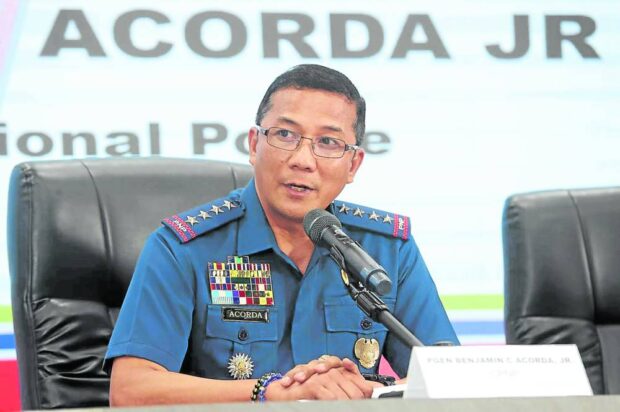
Philippine National Police chief General Benjamin Acorda Jr. holds a press briefing in this file photo taken on April 25, 2023 at Camp Crame in Quezon City. INQUIRER FILE PHOTO / NINO JESUS ORBETA
MANILA, Philippines — The Philippine National Police (PNP) emphasized on Monday that ensuring a peaceful and orderly Barangay and Sangguniang Kabataan (BSK) elections in October is the top priority of the police organization.
PNP chief Gen. Benjamin Acorda Jr. announced this as the PNP renewed its campaign to curb loose firearms, which he identified as a serious security threat during the scheduled polls.
Earlier, the PNP’s Civil Security Group (CSG) reported that out of the 30,068 guns owned by politicians, 8,313, or 27.64 percent, have expired licenses.
Acorda stated that the PNP would provide this data to the Department of the Interior and Local Government and the Commission on Elections (Comelec), which has already designated August 28 to November 29, 2023, as the gun ban period for the forthcoming elections.
“All responsible gun owners, including elected officials, should be aware that possessing firearms with expired licenses is illegal. Illegal possession of firearms is a punishable offense,” he emphasized.
In addition, the PNP chief revealed that among the 38 potential private armed groups identified by police authorities, 32 are based in Mindanao.
Acorda disclosed that he intends to meet with PNP regional directors in the country’s southern parts to gather more information about these private armed groups, primarily controlled by well-known politicians.
“Our monitoring and assessment are ongoing. We need to understand the specific threats they pose before and during the October elections,” Acorda explained.
“As the protector of the Filipino people, the PNP is fully engaged in this matter. We are approaching this case with caution and vigilance,” he added.
Citing intelligence reports, Acorda mentioned that these private armed groups consist of approximately 200 members armed with around 400 firearms.
He assured the public that the PNP is well-prepared to address any threats or violence these private armed groups may attempt to disrupt the scheduled polls.
RELATED STORY:
SC declares law postponing Brgy, SK polls unconstitutional